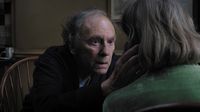MOVIE REVIEW
Amour (2012)
It’s long been argued by social commentators that advanced Western societies have yet to come to terms with the moral and philosophical implications of our rapidly aging populations and the subsequent issues around longevity, euthanasia and death. Symptomatic of this avoidance is our cultural neglect of these issues, with very few films and artworks examining themes of infirmity, dementia and the often ignoble circumstances in which many live out their final days. While no subject is too taboo for a cinematic culture that’s willing to parade all manner of unimaginable graphic imagery in front of us, it seems some matters are just too damn depressing to contemplate.
Luckily a filmmaker as intrepid as Michael Haneke is at hand. His new film — about an elderly couple’s valiant attempt to retain their dignity at all costs in the face of inevitable physical deterioration — feels like as timely and necessary film for our wider cultural discourse. Hopefully it will have enough impact to make its own meaningful contribution to the debate.
Jean-Louis Trintignant and Emmanuelle Riva play Georges and Anne, whose life is ruptured one day when Anne suddenly suffers a strange episode that turns out to the first symptom of a series of strokes. Anne’s insistence to stay at home and eschew the option of residential care forms the thrust of the story, as Georges’s final and unswerving act of love is to uphold this promise to remain her primary carer, battling against the insistence of their daughter (Isabelle Huppert) and assorted professionals to pursue other options.
As Anne’s condition worsens, it comes as no surprise that a director as uncompromising as Mr. Haneke — who revels in unsettling audience complacency — rarely relented from portraying the story’s emotionally traumatic and uncomfortable repercussions. It turns out that Mr. Haneke’s celebrated cold and detached efficiency is perfect for such a film; any other director might have found themselves in tear-jerker territory, but Mr. Haneke’s matter-of-fact delivery ensured we empathize with Georges and retain pride in his efforts despite his occasional misstep.
In fact it’s in one scene where Georges’s patience momentarily slips that we’re reminded of Mr. Haneke’s unique audience-jolting abilities: It’s as shocking in its own way as the notorious gasp-inducing rupture at the heart of “Caché.” There are other echoes of Mr. Haneke’s oeuvre in the film, such as the couple’s meticulously bourgeois Parisian apartment, reminiscent in its pointed specificity as that belonging to the other Georges from “Caché.” Similarly the fact that Anne is a former piano tutor who specialized in Schubert invites comparison with Erika from “The Piano Teacher,” although such allusions are unlikely to have been intended to invoke analysis.
But the issue of Mr. Haneke’s past and reputation casts something of a cloud over his comfortable handling of this material. Because it’s such a departure in terms of the response Mr. Haneke desires from his audience, there seems to be an air of hesitancy over proceedings. The director wants to keep the audience emotionally involved and empathetic: no Brechtian schisms or thought-provoking riddles required this time. But in his attempts to stop the audience reeling away from engagement into self-analysis (as knowledgeable viewers wary of the director’s previous ploys might be expecting), Mr. Haneke seems to hold back from delivering the truly searing experience one might expect. On the one hand he wants to respect the inherent dignity of this couple by not showing every conceivable moment of humiliation, but at the same time he has to give us the occasional bed-wetting scene that the material obviously requires. The result means that practiced Haneke-watchers might find the film a curious experience — like watching the efforts of a tentative protégé rather than the master himself — and it’s perhaps likely to provoke a more powerful response in those less familiar with his work (at least on first viewing).
The performances — especially Ms. Riva’s — are astonishing; and it’s wonderful to see such esteemed actors producing such late-career highlights as these (what a wonderful career Mr. Trintignant can look back on, peppered with great works in every decade). But while it’s a worthy, touching, thought-provoking and arguably essential film, unlike much of Mr. Haneke’s work it’s one I applaud more for its thematic bravery than for its cinematic audacity.
AMOUR
Opens on Nov. 16 in Britain and on Dec. 19 in Manhattan.
Written and directed by Michael Haneke; director of photography, Darius Khondji; edited by Monika Willi and Nadine Muse; production design by Jean-Vincent Puzos; costumes by Catherine Leterrier; produced by Margaret Menegoz, Stefan Arndt, Veit Heiduschka and Michael Katz; released by Artificial Eye (Britain) and Sony Pictures Classics (United States). In French, with English subtitles. Running time: 2 hours 7 minutes. This film is rated 12A by B.B.F.C. and PG-13 by M.P.A.A.
WITH: Jean-Louis Trintignant (Georges), Emmanuelle Riva (Anne), Isabelle Huppert (Eva), Alexandre Tharaud (Alexandre), William Shimell (Geoff), Ramón Agirre (Concierge’s Husband) and Rita Blanco (Concierge)

Comments